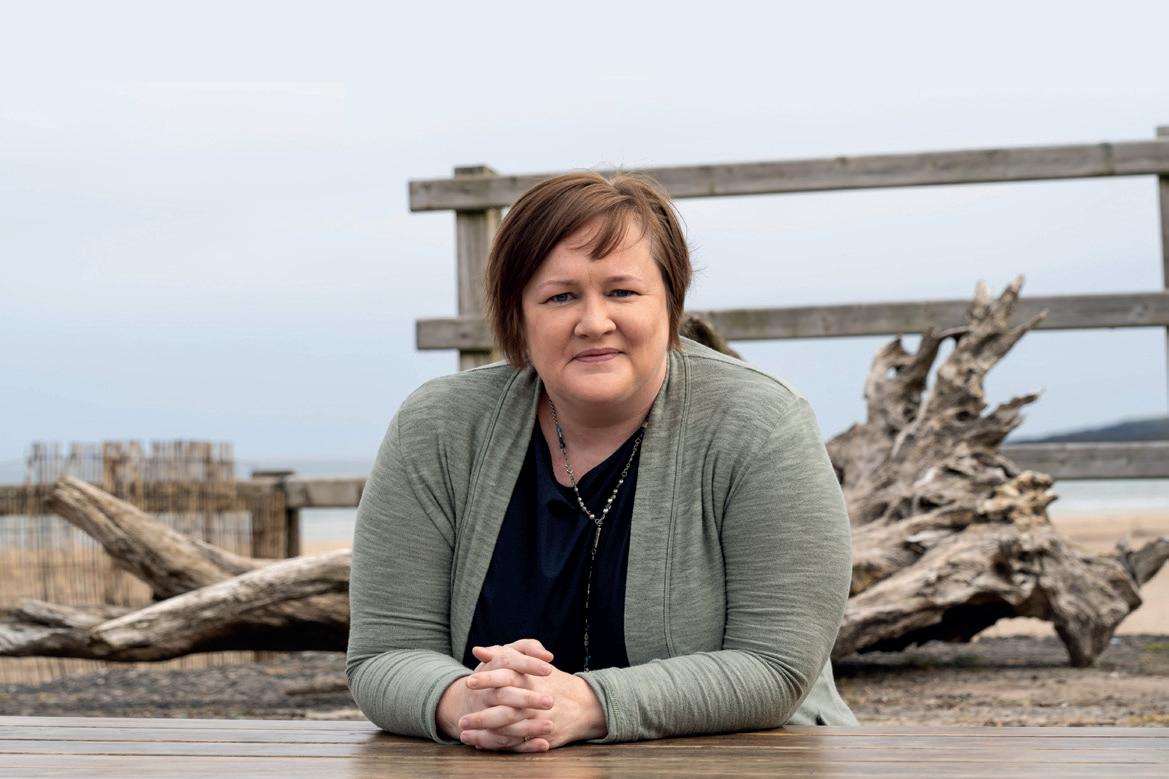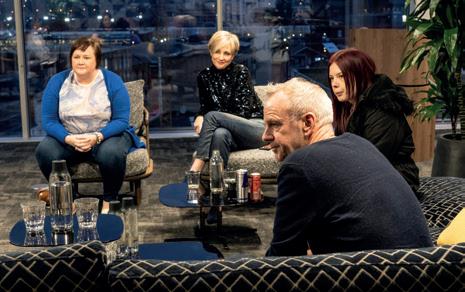
4 minute read
Hummingbird Project

From our darkest moments come the greatest gifts. CEO, Leigh Carey talks about how personal tragedy led her to establish Portstewart’s Hummingbird Project; a mental health support service run exclusively by mental health experts all of whom have experienced mental ill-health themselves.
Advertisement
Portrush mum, Leigh Carey (42) who is married to buildings supervisor, David (39) is still facing the fall-out from a gynae operation six years ago that did not go according to plan. It’s a medical issue that for legal reasons, she cannot go into great detail about but it was life-changing and at first, not at all in a positive way.
An exploratory procedure to help the couple have a sibling for their daughter Holly (12) led to a traumatic experience triggering anxiety so severe, that she was diagnosed with post-traumatic stress disorder.
While Leigh got through the surgery, she woke up to find it had left her unable to have more children as well as facing early menopause. The experience left her struggling and lost.
“There were so many factors involved in the trauma that caused my mental health to severely decline... it felt like the loss of womanhood and a loss of identity. It was so hard to even comprehend at the time.
“With Holly in nursery, we were meeting new people. It was in prime baby-making time. When the inevitable questions around siblings came up, I felt I needed to protect others from my experience, so either I laughed it off or it got to the point where I wasn’t able to socialise with other parents.
“I knew I was losing the person I was before.
My body changed; my confidence was shattered. Those couple of years afterwards were a dark time for us. I’m still suffering the medical consequences of what happened to me to this day.
“During my work in mental health, I had always kept the client at the centre of it. Going through it myself, I recognised all the support I had around me helped me to hold on by the skin of my teeth and not tip over the edge.”
Leigh’s experience left her fearful of hospitals, hyper-vigilant, emotionally unable to hold babies or small children and feeling deep regret for her husband David and daughter Holly, that there would be no more children. Resilience is a word much talked about at the Portstewart based Hummingbird Project. Psychological resilience is the ability to cope mentally or emotionally with a crisis or to return to pre-crisis status quickly.
Resilience exists when the person uses ‘mental processes and behaviours in promoting personal assets and protecting self from the potential negative effects of stressors.’
Leigh said: “Sometimes our darkest hours can bare the greatest gifts. For me, it was using my own lived experience of having mental ill health for the benefit of others. Lived experience makes all the difference when helping people. It has made me a better person and far better at my job.
“It made me able to come from a place of understanding of how traumas and social anxiety can impact you.
It is an insight you just cannot learn in a book.”
It was this motivation which drove Leigh to set up the Hummingbird Project. The organisation is operated entirely by a team of people who have all experienced mental ill health themselves. Resilience is something this team has in spades.
Leigh said: “We use the learning and insight we have gained from our personal stories combined with our expertise in mental health to help people who are struggling or going through some of the many difficult challenges life tends to throw at you.

“At Hummingbird, we are particularly proud of our Into Tomorrow Programme, a partnership we have developed with PwC. It’s an intensive, ground-breaking suicide prevention programme helping to tackle soaring suicide rates in NI and has delivered some incredible results.
“We are now working with our second cohort of young people. Such is our belief in the benefits of lived experience we have created a job for one of our young people from the first group to work alongside us and deliver the programme because we know how valuable this will be in building trust.
“A proud moment for us at Hummingbird was when Norman Cook/Fat Boy Slim took time out from his Belfast gig just before Christmas to meet with some of our young people, hear about their experiences and how the programme’s intensive one-to-one support really helped them get through some very dark days. He talked very openly to us about things he had found tough in his own life.

“Resilience is something we not only talk about at the Hummingbird Project but practice every day. We look out for each other that way and encourage other people to take control of their recovery through a system, unique to us we call the ‘three U model.’
It stands for, understand, unlock and uplift, she says. “We work with people to first understand their circumstances, what they like to do, find out what their strengths are and also any barriers they might have. Then we help them to decide what it is they want to do which could be a particular job or career or something as simple as just caring for their wellness or support with relationship issues.
“We help them to unlock their strength and remove any barriers. That is the uplifting part. It’s wonderful to see people understand what it is they want to achieve and then go out and try it and take ownership of their health and understand how to manage it.”
Leigh strongly advocates that early intervention is key.
“We have just come through one of the most disruptive times in modern history with the Pandemic and there is a war ongoing in Ukraine. This all has an impact on how we view the world and our mental health is affected. I think part of any mental health strategy should incorporate the thinking, there is a lot we can do to help ourselves.
“All the focus, time, money and effort, is spent dealing with mental health at the point of crisis when people are at the sharp end of the illness. We want to encourage people to put their hand up when they are struggling and help them recognise, that they will struggle at some point but there are steps that can be taken so they never reach a crisis point.
“I think the same way we look after our physical health; we should be taking just as good care of our mental health. Until this happens and society’s approach to mental ill-health changes, we’ll continue to experience a tsunami.
The Hummingbird Project offers a different model with intervention and prevention at its heart.” https://thehummingbirdproject.org.uk/












